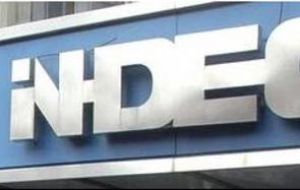MercoPress. South Atlantic News Agency
Twelve months inflation expectations in Argentina steady at 25%
 The accuracy of government statistics, provided by Indec, are questioned
The accuracy of government statistics, provided by Indec, are questioned Argentines expect prices to rise 25% over the next twelve months, according to the median estimate in a monthly survey by Buenos Aires-based Torcuato Di Tella University. Expectations in August remained unchanged from last month’s report, the university said in an e-mailed report.
The Di Tella poll of 1,199 people was conducted by Poliarquia Consultores from Aug. 2 to Aug. 11 and has a margin of error of 3.5 percentage points.
According to the University’s Finance Research Centre, CIF, expectations vary according to income levels. While the high income bracket saw prices drop a peak expectation of 30% to 25%, in the low income bracket the opposite happened with expectations soaring to 32%.
However this contrasts with the Market Expectations Survey (REM) which the Argentine Central Bank polls monthly with the latest index showing consumer prices for the twelve months of 2010 climbing to 11.2%.
This means that the gap between the Central Bank survey forecast and public opinion inflation expectations is 13.8 percentage points.
“The difference continues to be too high and continues to reflect people’s doubts about the evolution of prices and the official data”, said Guido Sandlers, head of CIF.
Earlier in the month Argentina’s National Statistics Institute, Indec, said that accelerating economic growth pushed annual inflation to 11.2% in July, the highest in four years.
Economists and government officials including Vice President Julio Cobos have questioned the accuracy of the inflation data, saying officials have underreported price increases since January 2007, when former President Nestor Kirchner made personnel changes at the statistics agency.
“Argentina’s macro management is still very poor,” said Bertrand Delgado, an economist at Roubini Global Economics LLC in New York. Argentina’s credit-default swaps will only “see a significant move downward with a regime change, to one that’s somewhat more market friendly and has the political capital to implement the necessary changes in macro policy. That’s still a long bet,” he said.
Argentine default swaps have tumbled from 1,379 basis points in May following on the government’s restructuring of 12.9 billion USD of defaulted debt, sparking a credit-rating upgrade by Fitch Ratings to B, or five levels below investment grade, from default.




Top Comments
Disclaimer & comment rules-

-

-

Read all commentsAnd here's us in the poor, broke UK worrying about 3% !
Aug 20th, 2010 - 03:34 am 0How about the “rich” United States? Obama declared that there was no cost of living increase in the U.S. in 2009. Maybe this is now a negative for 2010?
Aug 20th, 2010 - 08:22 pm 0@ Hoytred
Aug 21st, 2010 - 07:43 am 03% in UK an economy stagnation style is called stagflation close to deflation what is even worse than inflation.
Prices go down and companies enter into a war of prices to survive leading to a massive business bankruptcy then you are in a deep depression.
Commenting for this story is now closed.
If you have a Facebook account, become a fan and comment on our Facebook Page!